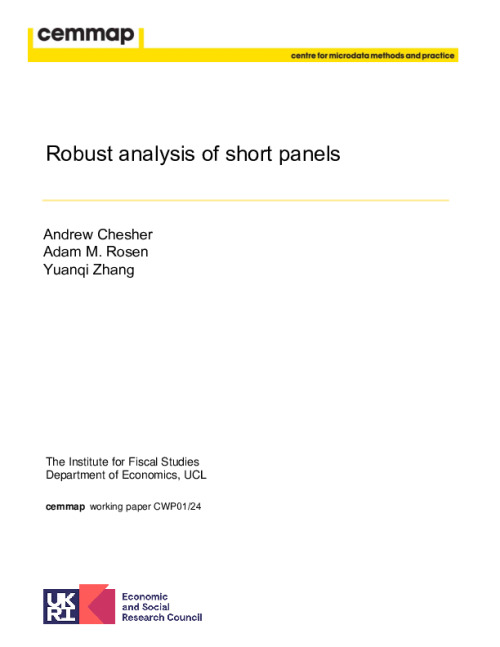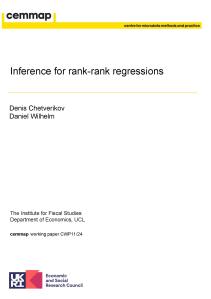Downloads

CWP0124-Robust-analysis-of-short-panels.pdf
PDF | 782.29 KB
Many structural econometric models include latent variables on whose probability distributions one may wish to place minimal restrictions. Leading examples in panel data models are individual-specific variables sometimes treated as “fixed effects” and, in dynamic models, initial conditions. This paper presents a generally applicable method for characterizing sharp identified sets when models place no restrictions on the probability distribution of certain latent variables and no restrictions on their covariation with other variables. In our analysis latent variables on which restrictions are undesirable are removed, leading to econometric analysis robust to misspecification of restrictions on their distributions which are commonplace in the applied panel data literature. Endogenous explanatory variables are easily accommodated. Examples of application to some static and dynamic binary, ordered and multiple discrete choice and censored panel data models are presented.
Authors

Research Fellow University College London
Andrew is the Director of the ESRC Centre for Microdata Methods and Practice (cemmap) and Professor of Economics and Economic Measurement at UCL.

Research Fellow Duke University
Adam is a Research Fellow associated with the Cemmap at the IFS and UCL and an Associate Professor of Economics at Duke University.
PhD Scholar University College London
Working Paper details
- DOI
- 10.47004/wp.cem.2024.0124
- Publisher
- Institute for Fiscal Studies
Suggested citation
A, Chesher and A, Rosen and Y, Zhang. (2024). Robust analysis of short panels. CWP01/24. London: Institute for Fiscal Studies. Available at: https://ifs.org.uk/publications/robust-analysis-short-panels (accessed: 29 June 2024).
More from IFS
Understand this issue

Cuts to council services likely unless cost pressures abate – even with the biggest council tax increases for 20 years
21 June 2024

Levelling Up: Is inequality between places Britain’s biggest problem?
16 August 2023

Government spending has long been targeted at the poorest in our society
5 June 2023
Policy analysis

ABC of SV: Limited Information Likelihood Inference in Stochastic Volatility Jump-Diffusion Models
We develop novel methods for estimation and filtering of continuous-time models with stochastic volatility and jumps using so-called Approximate Bayesian Compu- tation which build likelihoods based on limited information.
12 August 2014

What are the parties’ plans for benefits and taxes?
24 June 2024

How do the last five years measure up on levelling up?
19 June 2024
Academic research

Inference for rank-rank regressions
28 May 2024

Understanding Society: minimising selection biases in data collection using mobile apps
2 February 2024

The impact of labour demand shocks when occupational labour supplies are heterogeneous
28 June 2024